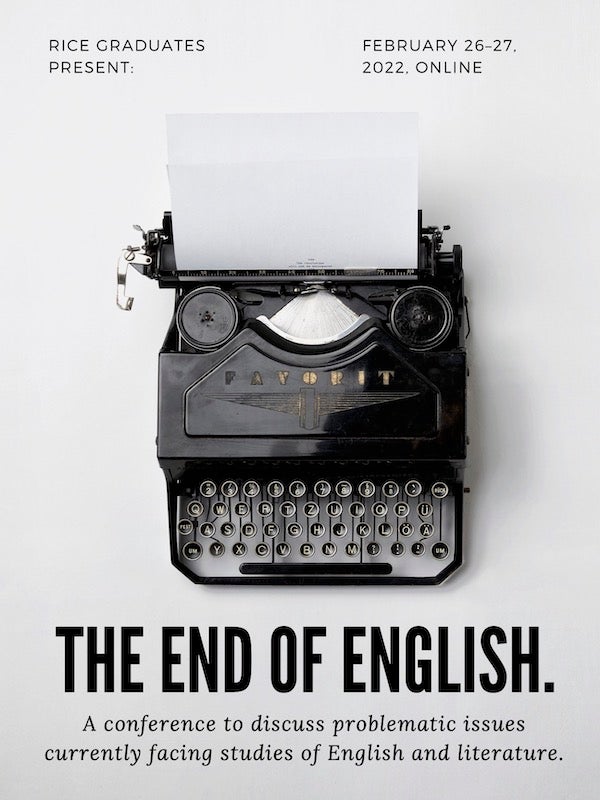Much has been written in recent years on the state of English as a department and a discipline. In 2013, a New York Times op-ed put it bluntly: “What’s less clear now is what we study the canon for and why we choose the tools we employ in doing so.”

But it was an article by Jesse Alemán, professor of English at the University of New Mexico, in the May 2021 issue of Publications of the Modern Language Association of America that inspired the title of this year’s graduate student conference in Rice’s Department of English.
“The End of English" will be hosted online Feb. 26-27. The conference, which received a flood of submissions and will feature Alemán as its keynote speaker, was organized by a group of Ph.D. students who discovered a mutual interest in discussing the complex and often problematic issues currently facing studies of English and literature during a 600-level course they took together last spring.
“The goal of the class was thinking about the question of ‘what is English now?’” said conference co-organizer Taylin Nelson of the Topics in Literary Studies course they took with Jose Aranda, professor of English and Spanish, Portuguese and Latin American Studies, and Emily Houlik-Ritchey, assistant professor of English.
“We actually had the task of forming our own department so we could think through the problems addressing institutional issues and what we’d like to see happen in the future,” Nelson said. They called their creation the Literature, Media and Cultural Studies Department.
It was a name that spoke to the issue of canon (in many English departments, that canon was traditionally a fixed span of Western literature) by decentralizing its European focus and including other important forms of media aside from books.
Contemplating these ideas became a passion project for the grad students. So when they first read Alemán’s article last summer, they knew they’d found the topic for the annual grad student conference that, as second-years, was their turn to host.
“The complicated legacies of race, slavery, coloniality and displacement demand from us that our discpline be more responsive and relevant to the conditions under which we live and teach, if not for us then for the students who continue to believe literature can make a difference,” Alemán wrote in his essay, “The End of English.”
“Even if we’ve added women and minority writers over the years, departments and their faculties remain ensconced in curricular literary categories or forms of literary learning that tend to limit our scopes of scholarship and teaching to the authors, aesthetics or genres of the dominant culture that we were trained to value.”
As Ph.D. students years into their English studies, Nelson and her colleagues — Jay Arora, Zainab Abdali, Megan Oakes, Michael Pons and Jessica Perry — have an intimate knowledge of what actually happens in English departments on a regular basis. They know theirs is not a narrow field.
Arora, originally from Duke University’s English department, studies Southern grotesque, food and film. Abdali, who also majored in math at Syracuse University, studies Muslim and Arab American literature, feminist theory and minority women's narratives. Oakes, who hails from the University of Washington, studies ecocriticism and speculative fiction. Perry, with two English degrees from Boston College, studies theories of capitalism and 19th-century British literature. Pons, from Florida State University and the University of North Florida, specializes in modernism, posthumanism and media theory. And Nelson, who graduated from King's College London and Arizona State University, specializes in 18th-century literature, posthumanism and animal studies.
“We know that what happens in an English department isn't Eurocentric; we don't just study American and British literature or literature written in English,” Perry said. ”We study a lot of theory, we all have different texts we read and translations we work with, so the title — ‘The End of English’ — is pertinent to us because we recognize that just the description of a discipline as English is currently really Eurocentric, so it's a conversation we want to have with people like Dr. Alemán.”
The group issued its call for papers last semester using eight open-ended prompts (sample topics include multilingual approaches to literary and cultural studies as well as the limits of disciplinarity itself) and was thrilled by both the quantity and variety of submissions received for the conference. It ultimately selected 22, which will be presented online over two days.
“They vary in exciting ways, both in perspective and in presentation,” Arora said. “We have pieces that are in the straightforward, academic vein and then we also have really creative pieces, so we're thrilled about everyone who's been passionate enough to submit something.”
In addition to his keynote speech, Alemán will also return to Rice this fall to work with more students and keep the conversation going. This too is exciting to the Ph.D. students, who didn’t imagine the project they started in that 600-level course would come this far.
“It really became something that we began to care a lot about, and I think we're going to continue thinking and talking about it beyond this conference,” said Nelson. They’re imagining reading groups along with other ways to offer continual opportunities to discuss a question that lies at the very heart of their work.
“It has definitely turned into kind of a passion for us,” Nelson said.
“The End of English,” Feb. 26-27, online. endofenglish.tumblr.com

